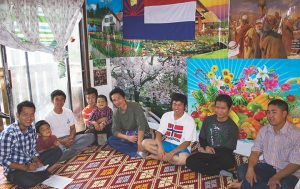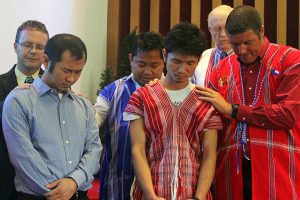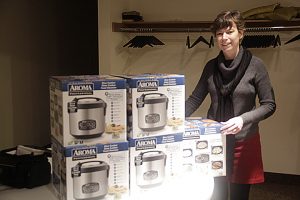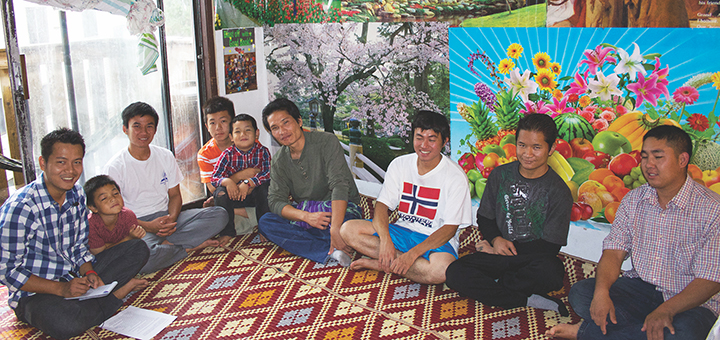Caring for Refugees in Mid-America
Every year millions of people around the world are forced to flee their home countries because of persecution based on race, religion, social group or political opinion. They arrive at refugee camps with no possessions and receive meager assistance. While waiting at the camps (some for as long as 10 years), they can apply for legal refugee status. The United Nations then determines where to place them. Annually over 72,000 refugees resettle in the United States, with approximately 9,000 arriving in the Midwest. They do not come because they want to—they come in order to save their lives. Caring for these hurting people is both our privilege and our duty.
If you extend your soul to the hungry and satisfy the afflicted soul, then your light shall dawn in the darkness, and your darkness shall be as the noonday.
– Isa. 58:10
Iowa-Missouri Conference
by Dean Coridan, president, and Michelle Hansen, communication director

Pastor Stephen Aung See (far left) works with the Burmese refugees in Des Moines. Robert (middle, in blue jeans) would not be sending his kids to the Des Moines Adventist School if it weren’t for the refugee ministry education fund. Photo by Michelle Hansen.
At the direction of its constituency and executive committee, the Iowa-Missouri Conference has added Refugee Ministry as one of its frontline ministries right alongside education, evangelism and youth ministries. Two years ago an education assistance fund was established to help send refugee children to Adventist schools in our conference. Today 10 percent of our students are refugees. One parent, Robert, (pictured above) says, “When I heard about the plan for tuition assistance it made me very happy. If there was no assistance, I would have to send my kids to public school and that would be very sad.”
Going forward, we want to establish programs that will help refugees more comfortably integrate into our communities, such as ESL classes, job search assistance, babysitting, tutoring and more. In order to further this ministry we are seeking the ongoing financial support of 1,000 people through a pledge card that can be downloaded at www.imsda.org/refugee. There is also a line item designation on the new tithe envelopes. All money goes directly to help refugees living in Iowa and Missouri.
Kansas-Nebraska Conference
by John Sweigart, vice president for administration

The Omaha Karen Company led by Sah Kler (middle back) currently has around 85 attendees. Photo by Vanessa Schaecher.
During the Kansas-Nebraska Conference’s 2014 camp meeting attendees gave $15,300 toward ministry for the Karen (pronounced Kurin) refugees in Omaha and Lincoln. This, combined with a similar amount from the conference, is funding a part-time salary for Pastor Sah Kler (pictured at right) to serve members of the Karen Company, many of whom are multi-generation Seventh-day Adventists whose grandparents were baptized by Dr. Eric B. Hare, the famous Dr. Rabbit of Burma.
There are nearly 5,000 Karen people in Omaha and more come every month. The conference has established a building fund for this group.
Donate to the Karen Refugee Fund.
Minnesota Conference
by Brian Mungandi, communication director

Since rice is the staple food in the Karen community, a rice cooker is considered a very special gift. Photo courtesy Minnesota Conference.
For nearly five years the Minnesota Conference has been funding a Karen Church under the leadership of Pastor See Nay in a program supporting refugees through gifts of rice cookers. “Taking a rice cooker to new immigrant families creates a chance to work with them to make sure they become part of the community,” says Pastor See Nay.
The Minnesota Karen churches have a membership of about 200 among the three groups See Nay oversees. However, they are ministering to more than 400 families in a wide range of activities that demonstrate the love of God.
This article was also published in the March/April 2015 print edition of OUTLOOK.








